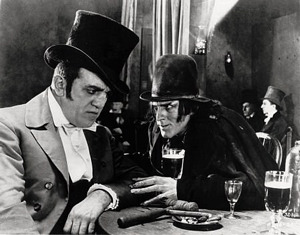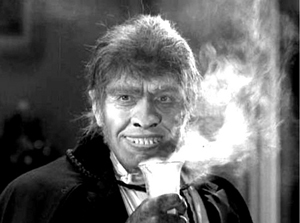
Source: Barleycorn chess set, KADUN, Wikimedia
In order to practice using word discovery tools in reading, we need something to read. In this lesson, you’ll get a chance to sample a classic story of transformation, not human to vampire transformation or living human to zombie transformation, but a human to human transformation, a transformation from good to bad and back again. This is a transformation story that has become a metaphor for different aspects of human personality.

Source: DoctorJekyllandMis1920, Dr. Blofeld, Wikimedia
You’ve probably heard references to Dr. Jekyll along with his alter ego Mr. Hyde. Maybe you've read or at least know the story in Robert Louis Stevenson’s novel The Strange Case of Dr. Jekyll and Mr. Hyde.
The story doesn’t start out introducing the reader to either Jekyll or Hyde but instead begins with a Mr. Utterson, Dr. Jeckyl's lawyer, and his friend Mr. Enfield. These friends are walking around London one Sunday afternoon, and they pass by a building with a two-story wall toward the street, a wall with no windows—just bricks and a single door. Mr. Enfield tells a story to Utterson about a night when he saw a horrible encounter between a man and a little girl outside this building. The child was running along one sidewalk toward a corner that the man was walking toward on the cross street. The man could not see the child, nor could the child see the man, but it was obvious that they would come together at the corner. The horrible part was that they did not just “come together” but collided. The man did not attempt in any way to avoid the child, and in fact trampled over her in a monstrous way.

Source: Fredric March as “Dr Jekyll and Mr Hyde” 1931, Jack Samuels, Flickr
When Enfield tells Utterson that the man’s name was Hyde, Utterson is shocked. This is the name of the person that his friend Henry Jekyll indicated in his will as his soul beneficiary. Why would Jekyll want to make such a man the recipient of his property and wealth? It was strange indeed.
Part I
Utterson goes to see another friend of Jekyll’s, Dr. Lanyon. It is here that we will pick up the story and catch sight of some interesting words.
As you read, consider which reading strategies, or tools, you would use for each of the highlighted words in the passage below if you became interested in it. Click on the word to see a discussion of tools that are appropriate in getting to know more about this word.

 Before you go on to the next part, take a minute to consider what you now know about the highlighted words and about the vocabulary strategies you can use to understand them. Use your notes to copy the list of the highlighted words above. Then, write notes on what you remember about the words’ meanings (try to do this without looking back). When you are finished, check your understanding to see possible responses.
Before you go on to the next part, take a minute to consider what you now know about the highlighted words and about the vocabulary strategies you can use to understand them. Use your notes to copy the list of the highlighted words above. Then, write notes on what you remember about the words’ meanings (try to do this without looking back). When you are finished, check your understanding to see possible responses. protégé: has prefix pro-; same affix as protect; meaning—protected person or person whose career is furthered by another person
besieged: siege + verb-making prefix; prefix adds the meaning of “excessive”
enslaved: slave + verb-making prefix; has a more negative connotation than “involved”
nocturnal: root is -noct-; meaning—night
Juggernaut: huge wagon in Hindu parade; meaning—unstoppable force; has a negative connotation
FAQ
Q: Why do I need to study foreign words like protégé?

Source: Fredric March as “Dr Jekyll and Mr Hyde” 1931, Jack Samuels, Flickr
A: You could, of course, look the word up every time, or actually, you could, in most cases, get the meaning from the context. Words, however, gather connotations and associations around them and are, therefore, slightly different in meaning from any definition. If you become familiar with words (including foreign words used in English), you will develop a “feel” for the way these words are used that no dictionary entry can pin down. People who are good at pool can put English, a spin, on the cue ball when needed. You can learn to sense when a writer has put “English” on a word giving it a subtle spin in one direction or the other.